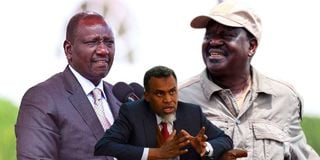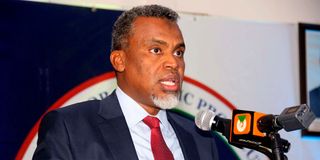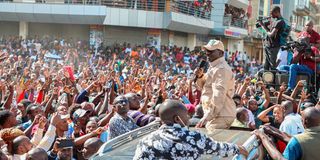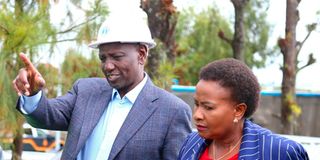Premium
Revealed: DPP Noordin Haji's hand in President Ruto, Raila bipartisan talks

President William Ruto (left), Azimio leader Raila Odinga (right) and Director of Public Prosecutions Noordin Haji (centre).
Director of Public Prosecutions Noordin Haji was involved in the behind-the-scenes negotiations that resulted in the bipartisan talks to end hostility between President William Ruto and opposition Azimio la Umoja One Kenya Coalition leader Raila Odinga.
Multiple sources in President Ruto and Azimio camps have placed Mr Haji at the heart of the talks that culminated in separate press conferences by the protagonists announcing a ceasefire on April 2.
The Saturday Nation has been informed that the President initiated the talks through Mr Haji, who led a team of five in discussions with a group of three from Mr Odinga’s side.
“It is the President who sent emissaries to Raila. We formed a team of two people to engage the other side,” ODM Deputy Party Leader Wycliffe Oparanya said.
His account of events was corroborated by Jubilee Secretary-General Jeremiah Kioni, Nandi Senator Samson Cherargei and several other politicians who did not want to be named.
Siaya Senator and Mr Odinga’s elder brother, Oburu Oginga, together with Prof Makau Mutua are said to have been part of the initial team of negotiators from the opposition coalition.
The talks started two days before the press briefings but gained pace on Sunday, April 2, in a concerted effort to forestall demonstrations that would take place the following Monday, which Mr Odinga had christened the “mother of all protests”.
Diplomats' pressure
Dr Ruto and Mr Odinga were also under pressure from the American, British, European Union, Chinese and Japanese governments to call a truce and halt the increasingly violent confrontations between protesters and state security personnel.

Director of Public Prosecutions Noordin Haji. The DPP was involved in the behind-the-scenes negotiations that resulted in the bipartisan talks to end hostility between President William Ruto and opposition Azimio la Umoja One Kenya Coalition leader Raila Odinga.
The protests resulted in deaths, injuries and widespread damage to property.
Azimio has asked the International Criminal Court (ICC) to investigate “police brutality against demonstrators and journalists covering the protests” (see story on page 5).
Though Mr Odinga did not personally engage the emissaries, he received constant briefings on their progress, with sources revealing back-and-forth deliberations before setting the rules of engagement.
The timing of the negotiations explains why Mr Odinga skipped a service at AIPCA Ruiru in Kiambu County.
His running mate in last year’s presidential election Martha Karua, Wiper Party leader Kalonzo Musyoka, Mr Kioni and other opposition leaders attended the service.
Mr Oparanya confirmed the central involvement of Mr Haji in the talks, which saw cases filed against opposition leaders dropped unconditionally to set the stage for the start of negotiations.
Mr Oparanya said the opposition did not find it odd that a public servant was involved in political negotiations, given the then widening gulf between Azimio and the government.
“It was not a concern to us at that time because you don’t know the relationship between who was sent and the President. Perhaps the president did it because of the trust he has in Haji,” Mr Oparanya said.
“What is on the table is the most important thing. I’d not waste time on whether he shouldn’t have picked a civil servant.”
The former Kakamega governor said more emissaries joined both sides.
He added that the discussions started in the morning and involved coming up with proposals before the opposition finally agreed to suspend the anti-government demonstrations.

Opposition leader Raila Odinga addressing his supporters in Eastleigh Nairobi on March 20, 2023.
“There were exchanges here and there. Both sides came up with proposals. All this happened on Sunday morning before the President made an announcement and our party leader did the same later in the evening,” Mr Oparanya said.
Another opposition politician, who did not want his name revealed, described Mr Haji as the main person from Dr Ruto’s side.
Withdrawal of cases
The involvement of Mr Haji in the talks could have informed the decision by his office to withdraw cases against opposition politicians immediately after the truce. However, it also raised many questions about his independence as a key stakeholder in the justice system.
The politicians had been charged with engaging in illegal demonstrations and malicious damage to property.
Contacted yesterday, Mr Haji declined to respond to our queries on his involvement in the talks.
He had previously denied any knowledge of the matter.
Prof Mutua described discussions on the emissaries involved in the truce as “unnecessary noise that has the potential of derailing the talks”.

President William Ruto (left) and Machakos Governor Wavinya Ndeti during the launch of Mavoko Water Supply project in Mavoko, Machakos County on April 14, 2023. PCS
He denied knowledge of the emissaries.
“Noise around where the talks started is a distraction to the work ahead in seeking a lasting solution. Let us focus on our destination. Those names are speculation. It is mere gossip,” Prof Mutua said.
Mr Kioni and Mr Cherargei gave credence to some of the accounts but each claimed that it was the rival camp that initiated the talks.
“It is Tinga (Raila) who first met the emissaries, including his brother. They wanted a way out of the protests without disappointing their supporters,” Senator Cherargei said.
He declined to name persons who represented the President.





